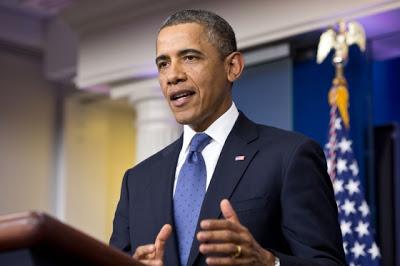 When President Obama first took office in 2009, he was a bit naive. He thought he could work with both parties in Congress for the good of the country, and that the Republicans would compromise in an effort to improve the economy and the lives of American citizens. He was wrong. The Republicans had no intention of compromising, or working with the president in any way. They spent the four years of his first term doing everything they could to obstruct everything the president proposed (and every appointment he made).
When President Obama first took office in 2009, he was a bit naive. He thought he could work with both parties in Congress for the good of the country, and that the Republicans would compromise in an effort to improve the economy and the lives of American citizens. He was wrong. The Republicans had no intention of compromising, or working with the president in any way. They spent the four years of his first term doing everything they could to obstruct everything the president proposed (and every appointment he made).Now that the president has been re-elected to a second term, it seems like he has accepted the reality of the current political situation in Washington -- that there is one party, the Republican Party, that is only interested in maintaining congressional gridlock. Here is what he told The New Republic in a recent interview:
There's not a—there's no equivalence there. In fact, that's one of the biggest problems we've got in how folks report about Washington right now, because I think journalists rightly value the appearance of impartiality and objectivity. And so the default position for reporting is to say, "A plague on both their houses." On almost every issue, it's, "Well, Democrats and Republicans can't agree"—as opposed to looking at why is it that they can't agree. Who exactly is preventing us from agreeing? And I want to be very clear here that Democrats, we've got a lot of warts, and some of the bad habits here in Washington when it comes to lobbyists and money and access really goes to the political system generally. It's not unique to one party. But when it comes to certain positions on issues, when it comes to trying to do what's best for the country, when it comes to really trying to make decisions based on fact as opposed to ideology, when it comes to being willing to compromise, the Democrats, not just here in this White House, but I would say in Congress also, have shown themselves consistently to be willing to do tough things even when it's not convenient, because it's the right thing to do. And we haven't seen that same kind of attitude on the other side. Until Republicans feel that there's a real price to pay for them just saying no and being obstructionist, you'll probably see at least a number of them arguing that we should keep on doing it. It worked for them in the 2010 election cycle, and I think there are those who believe that it can work again. I disagree with them, and I think the cost to the country has been enormous. But if you look at the most recent fiscal deal, I presented to Speaker Boehner a package that would have called for $1.2 trillion in new revenue—less than I actually think we need, but in the spirit of compromise—and over nine hundred billion dollars in spending cuts, some of which are very difficult. And yet, I'm confident we could have gotten Democratic votes for that package, despite the fact that we were going after some Democratic sacred cows. And had we gotten that done, it would have been good for the economy, and I think it would have changed the political environment in this town. Democrats, as painful as it was, as much as we got attacked by some of our core constituencies, were willing to step up because it was the right thing to do. And the other side could not do that. Hopefully, the president will take this new-found reality and learn to play the same kind of political hardball the Republicans have been playing. His legacy depends on it.

